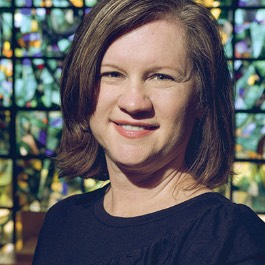The Vital Role of the Church: Announcing Good News
The church is not supposed to be known as certain and immovable, but called and sent.
 Sara Barton, University Chaplain
Sara Barton, University Chaplain
You don’t have to squint to see that the church in North America is encountering changes and challenges. Just to name a few—though you probably don’t need my help with this brainstorm—faith communities wrestle with decreasing attendance, declining interest in denominational heritage, and intensifying questions about issues like inclusion and the church’s relationship to political power—often all at the same time!
Even before having to confront the challenges posed by the COVID-19 pandemic, the church grappled with questions about when, where, how, and with whom to meet. After we leave the fearful season we are in now, I cannot help but wonder what new lessons will inform ongoing conversations.
I find it comforting and exhilarating to remember that changes, challenges, and recalibrations in the church are actually nothing new. The role of each generation of faithful Jesus followers has always been and will always be this: to discern in community and through the power of the Holy Spirit how to hold continuity and newness together in the proclamation of good news. This side of heaven, the church is never really finished with that job. Each generation must determine what it means to announce the good news of God’s reconciling work in its unique time and place.
A student recently asked me, “Christians talk about good news a lot. How is it good news that an angry God was satisfied only with his son’s violent death and wants to send me to hell forever?” I have similar straightforward conversations with many people who convey that they are sure about Christ but not so sure about the church and doctrines that sound like bad news. My students are certainly not the only ones who are wondering whether Christians know what good news is. They are not the only ones who are unsure about whether the message of the church today is good news.
In light of such challenges, a discussion about the vital role of the church is timely. I think Harbor director Mike Cope was on to something when he picked what was supposed to be this year’s theme, Called and Sent: The Vital Role of the Church. The fact that we had to postpone this year’s Harbor to 2021 means the theme is as relevant as ever. The church is not supposed to be known as certain and immovable, but called and sent. Especially during crises, our imagination should fuel us like never before. And, like many of you, I see that happening as congregations find new ways to connect with each other and new ways to love neighbors. The boundaries of physical distance have not prohibited spiritual and communal connection, as prayers have made their way through phone lines and Zoom rooms. I can sense the celebration that’s coming when we are able to gather again. I suspect it will be so life-giving that God’s people won’t be able to stop talking about it.
From the moment they realized Jesus was raised from the dead, Jesus’ earliest followers were directed, in both Matthew 28 and Mark 16, “Go. Tell.” They were “sent” people (Luke 24). Being sent to cross boundaries appears continually in the book of Acts, when the earliest Christians traveled “from Judea to Samaria to the ends of the earth,” crossing not only borders of cities, countries, and continents, but also boundaries that divide people: language, ethnicity, social class, citizenship, gender, food customs, and more.
This much is clear: crossing new boundaries for the sake of God’s good news is not for the weak of heart, soul, mind, or body. Despite what persecution they faced, like being thrown to the lions or disowned by their own families, God sustained early followers of Jesus in their calling, as communities discerned how to accomplish their task through the power of the Holy Spirit. Jesus and his early followers modeled that the good news really is so good that it must be announced, not only with words to share but also with bodies to do that good news: serving, loving, witnessing, and caring for the sick, poor, and socially marginalized.
If we are able to take the lessons learned from COVID-19, the church has the opportunity to posture herself not as the owner of good news, but as the “called and sent” proclaimers of God’s good news. And then, maybe instead of being turned off, our neighbors will tune in—or, better yet, we will all join in the work together.
